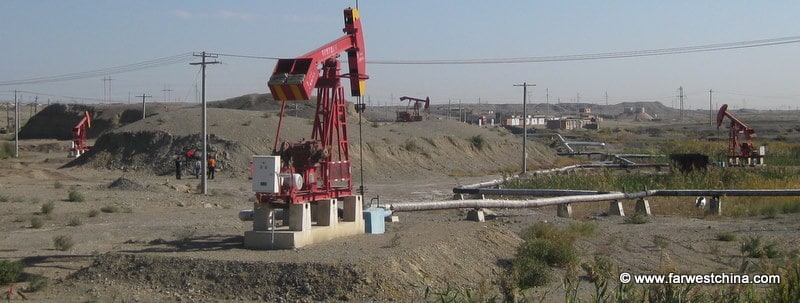A Xinjiang Oil Worker: Personal Portraits
“You can sit down on the floor” Sam said to me, pointing to the mass-market carpet that took up almost the entire living room.
We had just finished dinner and I had been wandering around this humble 5th floor apartment enjoying the cool breeze gently pushing through the windows. Two bedrooms, an office, a bathroom the size of a coat closet, a kitchen and a living room made up the small but cozy space that Sam and his wife had called home for the past 4 years.
Were it not for the numerous apartment buildings of monotonous concrete design that surrounded Sam’s home we might have been able to look out the window and enjoy the sun shining its final rays over the flat desert to the southeast.
It is in this very desert, dotted with oil rigs as far as the eye can see, that wealth has been created to sustain over 60% of Xinjiang’s economy. Sam is just one of many workers who earn their living by helping to feed the world’s insatiable appetite for the black river that flows beneath them.
“I don’t usually work on the oil field” he explained to me. “My department services the equipment used to drill wells in the oil field. I go out into the field occasionally to work on a rig that needs repair, but most of the time I stay at our company headquarters.”
While an office job might seem like an ideal position to hold here in Xinjiang, I was surprised to learn how Sam and his co-workers had been affected by the global financial crisis. “When the price of oil drops, my salary drops with it” he said. “Because my salary is heavily dependent on bonuses and the price of oil, over the past two years it has fluctuated from as high as 2,800 RMB (US$400) down to as low as 800 RMB (US$115) per month.” He never knows how much he makes each month until the paycheck clears his bank account.
He went on to explain that in order to ensure balance and stability in Xinjiang, the government has prohibited the oil companies from making any layoffs. To compensate for this regulation, every employee has taken a cut in pay and some have even been required to take several days “unpaid-vacation” every month. Over the past year the ownership of Sam’s company has changed hands and he has even been moved to a different department, but not once was he afraid of losing his job.
“I’m actually in an awkward position right now” he whispered to me, as if divulging a dark secret. “I think I have a chance of getting promoted this year after winning that award and gaining favor with my bosses.” The award he was referring to is an honor he was given for his high marks in the company’s recent employee evaluations. I wasn’t quite sure how such good news could be awkward, but he was quick to explain:
“I would love a promotion, but I can’t stand 白酒 (baijiu)!” he told me with a smile. Baijiu, also known as “white lightning” or “jet fuel“, is a popular liquor in China containing between 40-60% alcohol, a drink commonly found drifting around the banquet table. In order for Sam to be accepted as a company leader he would be required by social protocol to drink copious amounts of this liquid on a nightly basis.
“Back in my hometown my dad earns extra money distilling a rice-based baijiu and I never like drinking it with him. If I don’t drink with my bosses, though, I have no chance of getting promoted.” As an example Sam told me about a friend of his who has been the vice-president of one of the company divisions for over 20 years. “The division leadership position has changed multiple times in that 20 years, but he was never considered for the job because he can’t hold down his liquor.”
Sam has lived most of his life in Xinjiang, but he has dreams of moving back to the south. While he invests a bit in the crazy market, his dream is to eventually buy a house in a south-central province in China. “I’d love to finally move out of the oil business and live in a place where the weather isn’t so extreme.”
Considering that the Xinjiang-Guangzhou oil pipeline should begin pumping in 2011, maybe he could just move down to Guangzhou and find more work in the oil industry.
Of course, as I soak in the beauty and simplicity of his current surroundings, I can’t imagine why he’d want to leave.







